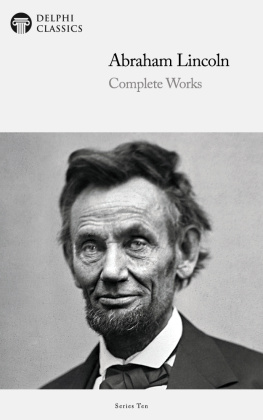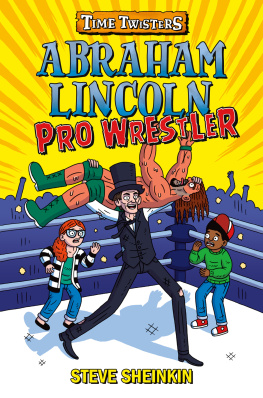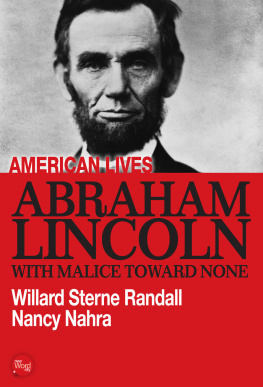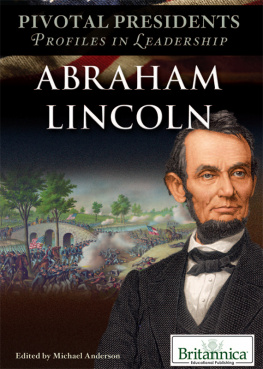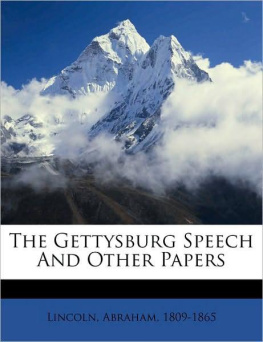Michael Burlingame - Abraham Lincoln, African Americans, and the Pursuit of Racial Equality
Here you can read online Michael Burlingame - Abraham Lincoln, African Americans, and the Pursuit of Racial Equality full text of the book (entire story) in english for free. Download pdf and epub, get meaning, cover and reviews about this ebook. year: 2021, publisher: Pegasus Books, genre: Detective and thriller. Description of the work, (preface) as well as reviews are available. Best literature library LitArk.com created for fans of good reading and offers a wide selection of genres:
Romance novel
Science fiction
Adventure
Detective
Science
History
Home and family
Prose
Art
Politics
Computer
Non-fiction
Religion
Business
Children
Humor
Choose a favorite category and find really read worthwhile books. Enjoy immersion in the world of imagination, feel the emotions of the characters or learn something new for yourself, make an fascinating discovery.

- Book:Abraham Lincoln, African Americans, and the Pursuit of Racial Equality
- Author:
- Publisher:Pegasus Books
- Genre:
- Year:2021
- Rating:4 / 5
- Favourites:Add to favourites
- Your mark:
- 80
- 1
- 2
- 3
- 4
- 5
Abraham Lincoln, African Americans, and the Pursuit of Racial Equality: summary, description and annotation
We offer to read an annotation, description, summary or preface (depends on what the author of the book "Abraham Lincoln, African Americans, and the Pursuit of Racial Equality" wrote himself). If you haven't found the necessary information about the book — write in the comments, we will try to find it.
Abraham Lincoln, African Americans, and the Pursuit of Racial Equality — read online for free the complete book (whole text) full work
Below is the text of the book, divided by pages. System saving the place of the last page read, allows you to conveniently read the book "Abraham Lincoln, African Americans, and the Pursuit of Racial Equality" online for free, without having to search again every time where you left off. Put a bookmark, and you can go to the page where you finished reading at any time.
Font size:
Interval:
Bookmark:
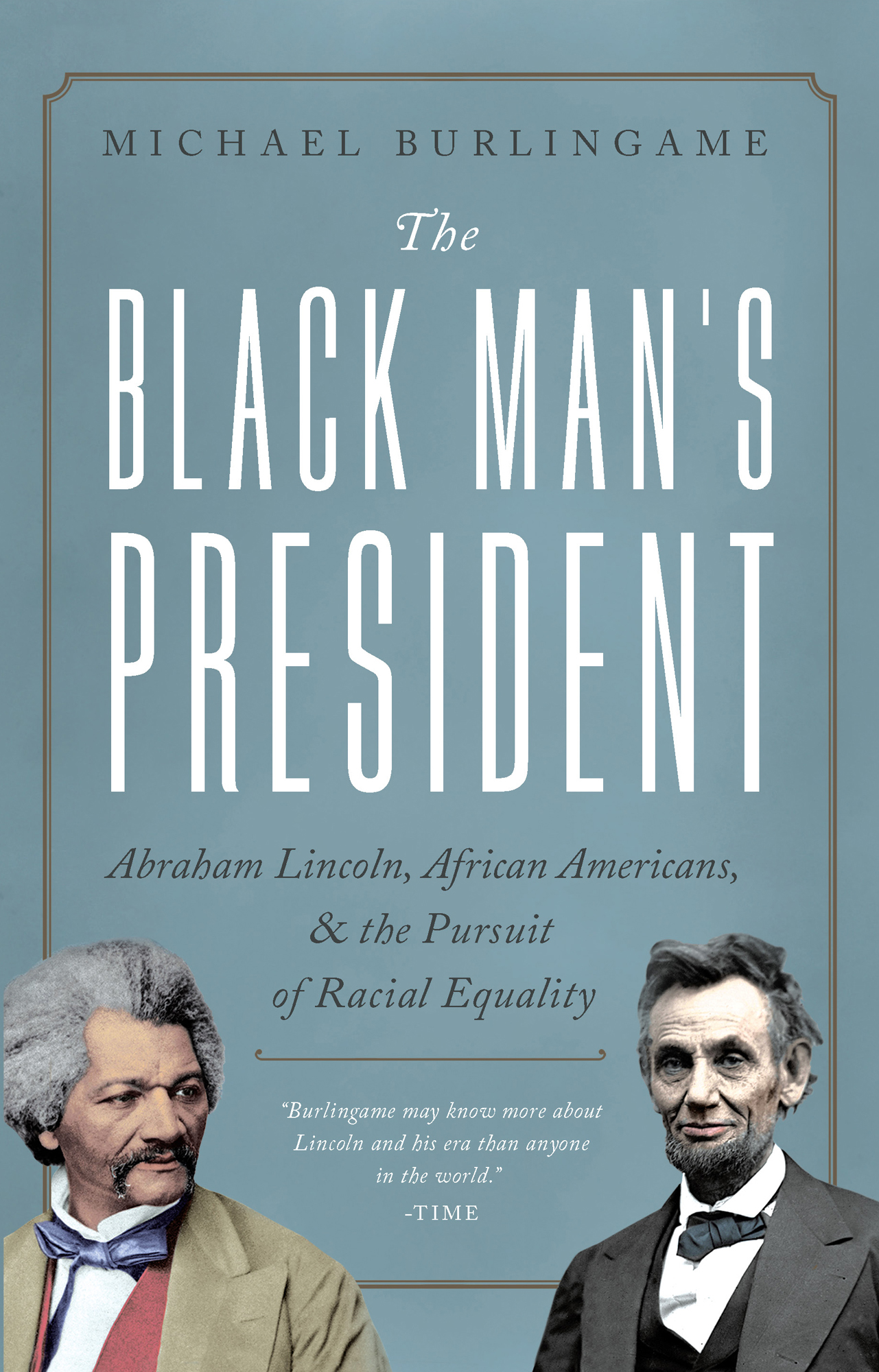
Michael Burlingame
The Black Mans President
Abraham Lincoln, African Americans, and the Pursuit of Racial Equality
Burlingame may know more about Lincoln and his era than anyone in the world.
-Time

For Richard Hart, who pioneered the way
O n June 1, 1865, Frederick Douglass strode into the Great Hall of New Yorks Cooper Union where an immense mixed audience, people of color predominating, gathered to hear the famed African American orator eulogize Abraham Lincoln, assassinated six weeks earlier because he had, for the first time, publicly endorsed Black voting rights. Every seat was filled, and several hundred persons were compelled to stand, according to the New York Times. On the extended platform sat scores of prominent citizens alongside a select class of young ladies, students at the citys Black schools, who sang several numbers that evening. Presiding over the event was the Black abolitionist and educator Ransom F. Wake, who read a long statement condemning in unmeasured terms the New York City Councils order, issued in April, forbidding African Americans from participating in the funeral procession when the train bearing Lincolns remains to Springfield passed through Manhattan. Incensed by the Councils action, Wake helped organize the Cooper Union meeting to protest the ban and allow African Americans to properly mourn Lincoln.
After reading the protest, Wake introduced Douglass, who began by further condemning the Councils action as one of the most disgraceful and sickening manifestations of moral emptiness ever exhibited by any nation or people professing to be civilized. But, he asked, paraphrasing Hamlets query about Queen Hecuba of Troy, what was Lincoln to the colored people or they to him? Answering his own question, he stated flatly that Lincoln was emphatically the black mans President, the first to show any respect for the rights of a black man, or to acknowledge that he had any rights the white man ought to respect, the first chief executive to rise above the prejudices of his times and country. Lincoln treated each African American not as a patron, but as an equal.
Months earlier, at the opposite end of the ideological spectrum, a Democratic newspaper which had been critical of Lincoln used some of that very language while asking with a sneer, When did we ever have a President that made so much of the negro, or was ever [so] willing to take him into his private and social circles as Abraham Lincoln does? Mr. Lincoln is emphatically the black mans president and the white mans curse.
The best evidence to support the contention that Lincoln was emphatically the black mans president is not just his policy decisions and public statements regarding emancipation, the enrollment of Black troops, and Black voting rights, but also his personal relations with African Americans. Because interactions speak louder than words, Lincolns views on race are best understood through an examination of his dealings with Black Illinoisans and Black Washingtonians. His meetings with Frederick Douglass are well-known, but not his similarly revealing encounters with many other African Americans.
As a racial egalitarian, Lincoln condemned the doctrine of White superiority. Let us discard all this quibbling about this man and the other manthis race and that race and the other race being inferior, and therefore they must be placed in an inferior position, he boldly announced at the outset of his campaign for the Senate in 1858. Let us discard all these things, and unite as one people throughout this land, until we shall once more stand up declaring that all men are created equal. I leave you, hoping that the lamp of liberty will burn in your bosoms until there shall no longer be a doubt that all men are created free and equal.
Historian David S. Reynolds observed that Lincolns public racial pronouncements were sometimes conservative, yet those public racial pronouncements made during his presidency were often far from conservative.
Lincoln believed that the chief aim of government was to lift artificial weights from all shouldersto clear the paths of laudable pursuit for allto afford all, an unfettered start, and a fair chance, in the race of life. The Declaration of Independence stated that all men are created equal and endowed by their Creator with certain unalienable Rights. Individualsnot states, not regions, not identity groupswere endowed with rights. He rejected the concurrent majority theory of John C. Calhoun, who insisted that the two main regionsNorth and Southhad equal rights, particularly to carry into the western territories whatever they wished, including slaves. Lincoln likewise rejected the notion that one race had rights that other races did not.
While Lincoln stressed that all people deserved an unfettered start, and a fair chance, in the race of life, he did not believe that everyone would succeed equally. As he told a Connecticut audience in 1860, I want every man to have the chanceand I believe a black man is entitled to itin which he can better his condition. He added that it is best for all to leave each man free to acquire property as fast as he can. Some will get wealthy. I dont believe in a law to prevent a man from getting rich. He and his fellow Republicans, he insisted, wish to allow the humblest man an equal chance to get rich with everybody else.
Lincoln thought that success in the race of life depended on resolute determination, industry, and dedication to self-improvement. To one young man who wished to become a lawyer, he suggested that work, work, work, is the main thing.
Lincolns advice resembled that of Frederick Douglass, who declared that even people of only ordinary ability and opportunity can succeed in the race of life if they would make their watchwords WORK! WORK!! WORK!!! WORK!!!! Douglass elaborated: Not transient and fitful effort, but patient, enduring, honest, unremitting and indefatigable work into which the whole heart is put.
Lincoln championed equality of opportunity, not of results. Industrious, resolutely determined, self-improving, upwardly striving people of all races and religions would succeed if artificial weights were lifted from their shoulders and the paths of laudable pursuit were cleared. If some people failed, it was not the fault of the free labor system but rather because of either a dependent nature which prefers it, or improvidence, folly, or singular misfortune.
Chapter 1 covers Lincolns years in Springfield, where, as historian Kenneth J. Winkle noted, Lincoln had extensive interaction with African Americans, living in a racially mixed neighborhood, representing African American clients, employing Black servants, knowing Black conductors on the Underground Railroad, befriending a leader of the Black community, and championing the antislavery cause.
Lincoln did not meet with Black visitors during the first year of his presidency, but throughout his time in the White House he did interact with the mansions Black staff members. Chapter 2 examines those interactions with African American employees, who found him a cordial, respectful, natural egalitarian. Among them was a leader of Washingtons Black community, the impressive William Slade, who served as chief butler as well as a confidant to Lincoln. This chapter also describes Lincolns interactions with African Americans outside the White House, including his memorable tour of Richmond soon after Union forces captured it, his visits to hospitals, and his inspection of United States Colored Troops.
Font size:
Interval:
Bookmark:
Similar books «Abraham Lincoln, African Americans, and the Pursuit of Racial Equality»
Look at similar books to Abraham Lincoln, African Americans, and the Pursuit of Racial Equality. We have selected literature similar in name and meaning in the hope of providing readers with more options to find new, interesting, not yet read works.
Discussion, reviews of the book Abraham Lincoln, African Americans, and the Pursuit of Racial Equality and just readers' own opinions. Leave your comments, write what you think about the work, its meaning or the main characters. Specify what exactly you liked and what you didn't like, and why you think so.


